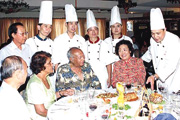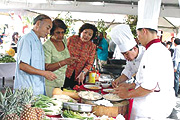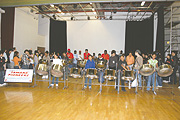 The Chinese community in Trinidad owes its origin to four moments of migration. The first was as early as 1806, when a single colony of 200 men left the East, bound for Trinidad on the East India Company vessel Fortitude. They were recruited mainly from Macao and Penang in Malaya, rather than from the mainland. This experiment-designed to replicate the successful emigration to Penang, was a failure, and was not repeated. The Chinese community in Trinidad owes its origin to four moments of migration. The first was as early as 1806, when a single colony of 200 men left the East, bound for Trinidad on the East India Company vessel Fortitude. They were recruited mainly from Macao and Penang in Malaya, rather than from the mainland. This experiment-designed to replicate the successful emigration to Penang, was a failure, and was not repeated.
One hundred and ninety-three arrived in Trinidad on October 12, 1806. Upon their arrival, many were distributed to sugar plantations. An estate two and a half miles west of Port of Spain, in Cocorite near Fort George, was also rented in order to house those who preferred to live as a community of artisans and peasant cultivators, growing food for the urban market. Many of these became fishermen, pork butchers, carpenters, shoemakers, in addition to growing food.
The second stage took place in the 1850s and 1860s. The Chinese who arrived in the West Indies were a small part of a much larger migration of free and indentured labourers from China to the Americas during the 19th century. arrived in the West Indies were a small part of a much larger migration of free and indentured labourers from China to the Americas during the 19th century.
About 96 per cent of the Chinese who migrated to the Americas in the 19th century came from a small region in southern Guangdong province. Most Chinese communities in the West Indies are basically Cantonese in origin, and they included not just the Punti or “Locals”, but large numbers of Hakkas also living in Guangdong at the time.
 The third stage came at the end of the 19th century and lasted roughly until the end of the Second World War (1890s to 1940s). While these new migrants were arriving from China proper, several hundreds were also simultaneously arriving in Trinidad from other colonies in the Caribbean region, in particular British Guyana on the South American mainland. The third stage came at the end of the 19th century and lasted roughly until the end of the Second World War (1890s to 1940s). While these new migrants were arriving from China proper, several hundreds were also simultaneously arriving in Trinidad from other colonies in the Caribbean region, in particular British Guyana on the South American mainland.
Their spontaneous arrival into Trinidad extended well in the 1950s and 1960s, up to Trinidad’s Independence in 1962, when immigration regulations became a little more stringent.
|